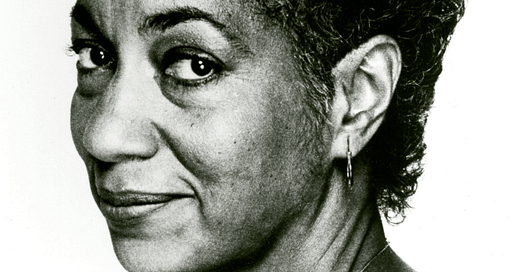“Poetry is not a shopping list, a casual disquisition on the colors of the sky, a soporific daydream, or bumpersticker sloganeering. Poetry is a political action undertaken for the sake of information, the faith, the exorcism, and the lyrical invention, that telling the truth makes possible. Poetry means taking control of the language of your life. Good poems can interdict a suicide, rescue a love affair, and build a revolution in which speaking and listening to somebody becomes the first and last purpose to every social encounter”.
— June Jordan, June Jordan’s Poetry for the People: a revolutionary blueprint, emphasis added
June Jordan’s writing evokes joy within me. I’ve appreciated her uncanny powers of self-expression ever since my teenage self first heard her iconic phrase, “we are the ones we’ve been waiting for”, though it would take years before I knew that she composed that immortal lyric.
Her turns of phrase convey the largeness of her humanitarian, deeply spiritual vision. In remembrance of her, I dedicate this Substack microessay to Jordan’s insights on the poetry as political action, as words suffused with immense, life-changing power.
In the excerpt above, Jordan rejects the idea of poetry as a decoration of images and metaphor unrelated to the real stuff of making a life. With profound care, Jordan not only debunks the vision of poetry as ornamental— she also sets forth a more comprehensive, convincing, and captivating vision of poetry.
One aspect of that vision blesses me, and hopefully you, on today: “poetry means taking control of the language of your life”. This phrase rings so true it shouts like Sunday morning. I can recall experiences in college where I fully swallowed lectures and sermons, not realizing that absorption without analysis in one’s own words can mean forfeiting our sacred, inviolable right to interpret our own experience and to live under the gravity of our conclusions.
Think with me for a moment. It’s not terribly difficult to let someone else, to let something else, govern the language of our life. It might be media networks and memes whose perspectives establish the boundaries of what we deem relevant, and worthy of our attention. It may be tastemakers and art critics whose spirited, if sometimes minimally sourced opinions, live rent free in our minds due to their projected certainty, due also to the repetitive force of algorithms amplifying their viewpoints across social media timelines. It could be mentors, parents, faith leaders whose influence over our intellectual development and life choices has tipped, without our consent, from formative and inspirational to one of compliance and unquestioned assent. Too often, we find ourselves strolling and scrolling through life, with the words of our mouths and the meditations of our hearts being established by human beings whom we elevate to the unmerited status of gods by allowing them to control the language of our lives. Ironically, God, who could presumably exercise such influence, does not do so, and according to a certain line of Christian reasoning, actually delegates that awesome, world-forming power to us: someone I read that life and death is in the power of the tongue.
Poetry is a hammer shattering the linguistic command and control of others’ words upon our spirit. Poetry, if Jordan is right, is the political action of taking back control not simply of language, but taking back language so as to take back our very lives. It’s retrieving and reclaiming our own powers of approval, self-definition, our own terms of entrance into and within particular communities.
Poetry is not always pristine, nor perfect. It is a pathway. Plain sentences of free verse and elaborate stanzas alike are stones upon a path; a path along which we exercise an informed freedom to craft and edit our very selves through the symbols and sentences of language. As a pastor and writer, poetry provides a practical, precious pathway to make revolutionary words flesh in our historical experience, to the end that we actually become love, embody faithfulness, and craft hope through how we show up in this world.
Take back your words, take back your life.



How necessary and true this is. It is vital to recognize, name and nurture those spaces of autonomy we retain even in repressive systems and circumstances. “There! That’s a space, and here, another!”